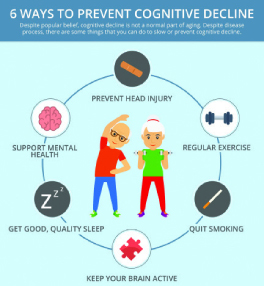As we grow older, many of us notice a decreased ability to remember a person’s name, a sequence of events or even what we had for lunch yesterday. We call it “a senior moment,” and the more we notice this occurring, the more we ask ourselves: “Am I losing it?”
Losing our mental capability is one of the biggest concerns we have as we age. The fact of the matter is that research suggests over 500,000 people die each year of Alzheimer’s and many families know the burden of taking care of elderly parents and the challenging decision to move them into memory care facilities or nursing homes.
But cognitive decline can start years before symptoms emerge, depending on various factors: genetics, inherited and/or acquired belief systems, diet/nutrition, pathological aging due to toxins and inflammation, immune function, physical trauma/injury and inactive lifestyle.
Genetics are important when evaluating a person’s propensity toward health or illness, however the concept of a genetic predisposition toward a particular disease might be seen as a “sentence” rather than useful information on family health history.
More recently though, a new way of thinking about genetics has emerged in the field known as epigenetics. In his book “Biology of Belief,” Dr. Bruce Lipton introduces us to the view that certain genes can either be “switched on” for better health and other genes “switched off” to lessen detrimental health effects.
This new science shows us that genes and DNA do not control our biology, rather the information our cells receive from the interaction between mind and body does. That means we may be able to influence genetic outcomes through nutrition and other measures.
So, how do you check and address above mentioned factors and what can you do to reduce or maybe even prevent deterioration of the brain?
Author Michael Morgan gives us hope with his book “Prevent Alzheimer’s in just 10 Minutes a Day,” suggesting that the combination of changes in life-style and self-care can significantly change the landscape of our brain.
Stress reduction is the number one recommendation. We all know and have heard it over and over that chronic stress can cause or exacerbate physical and mental health problems.
But we also know there are situations in life that cannot be changed or avoided. After more than 18 months of a global pandemic with devastating and often irreversible changes to our everyday routines, many have experienced an increased level of stress, anxiety and exhaustion.
Therefore we need to learn how to change our reaction to these situations by calming our sympathetic nervous system, the one that causes a Fight, Flight or Freeze response (these responses refer to involuntary physiological changes that happen in the body and mind when a person feels threatened, whether the danger is real or perceived).
How? That depends…
There are countless methods and modalities available and accessible but there are also countless different health issues, personalities with different schedules and means, likes and dislikes. The trick is to find what works for YOU, what helps your mind and body relax.
Is it meditation, visualization, music therapy, creative art, journaling or a combination of mind/body therapies, like yoga, tai chi, or qigong? Is it gardening, cooking, serving others? Or receiving the healing power of touch with massage or craniosacral therapy? Only you can discover how to change and maintain your well-being and health.
The same approach is true for the other recommended life-style changes: healthy eating and nutrition, rest and sleep, exercise, environmental awareness, nourishing relationships, being part of a community.
Where to start? Helpful resources on the world of health, aging and longevity can be found on the Internet. Go to ChangingAging.org, Phoebe.org, Researchgate.net or just Google “Functional approach to aging” or “Your brain on stress.”
When should you start? NOW. You can choose your favorite and most effective way to reduce accumulated wear and tear in body and brain to improve vitality and well-being. So, brush away those cobwebs and be vibrant at any age.
Linda Hellman, BS, LMT is a CranioSacral Therapist and Wellness Coach in Palm Coast, Florida. See www.changetowellness.com for more information.

